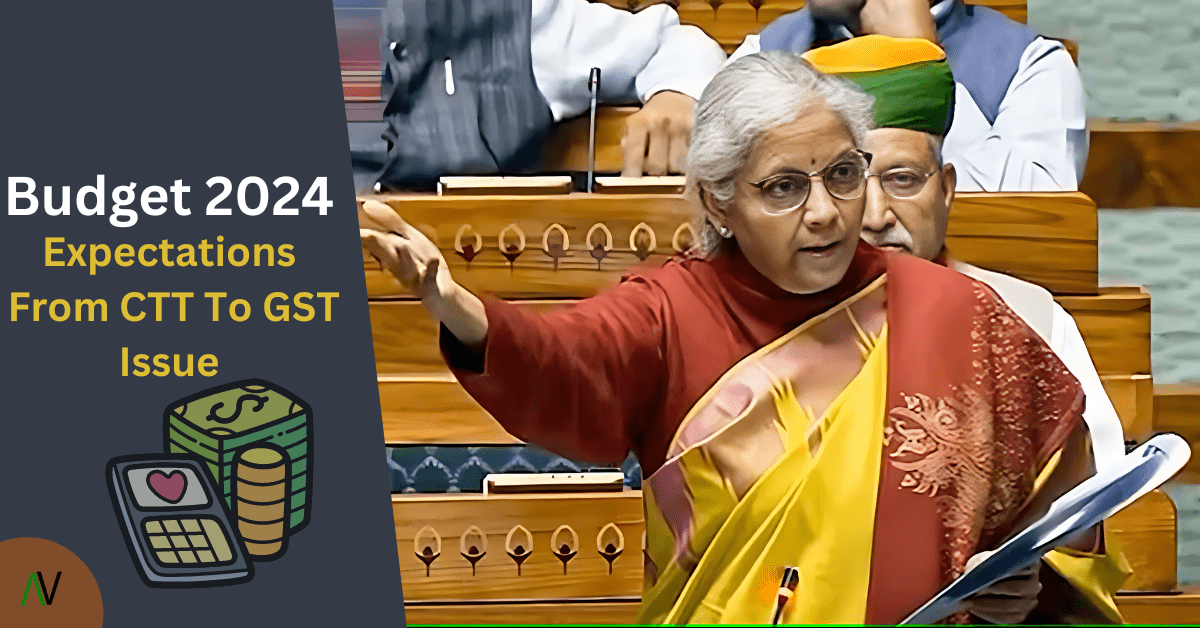Budget 2024 Expectations: Commodity markets have emerged as a reliable exchange for managing the risks associated with commodity trading in India. However, the growth rate has slowed since the Commodity Transaction Tax (CTT) was implemented in 2013. Commodity markets still have a huge unfinished agenda. The interim budget 2024 could be a good start in addressing these long-standing issues.
The interim budget will be presented on February 1 by Union Finance Minister Nirmala Sitharaman. After the forthcoming 2024 Lok Sabha elections, the new government will take office and announce the full budget for the fiscal year 2024–2025.
Six pre-budget expectations have been outlined by experts in the commodity market. These expectations include the elimination or reduction of the CTT, GST concerns, providing farmers with adequate infrastructure, permitting commercial banks to trade commodities, and opening the commodities market to non-resident Indians.
In addition to these demands, corporates in India must hedge domestically, according to Rishi Nathany, Chief Business Officer of the Multi Commodity Exchange of India Limited (MCX), which will greatly boost the liquidity of the Indian commodity derivative markets.
He said, “It will keep precious forex in India and instill the culture of hedging which will be good for our overall economy because India cannot dominate the world market unless we are price-makers, not takers.”
Take a look at the top budget expectation of the commodity market
- Abolishment/Reduction Of Commodity Transaction Tax
CTT makes up the majority of transaction costs. Since the commodity market is cost-elastic and we have the highest transaction costs in India, we have been pressuring the government to lower CTT. Very little demand will exist if the price is raised. We have submitted our proposal to the government for CTT rationalization,” Dr. Ashok Dalwai, the chairman of the Commodity Derivatives Advisory Committee (CDAC) and the Doubling Farmers Income Committee, told LiveMint.
Wadhwa thinks that removing the Commodity Transaction Tax (CTT) from both agri-processed and non-agri commodities will attract hedgers who have been negatively impacted by rising impact costs and transaction costs, which are mostly brought on by the CTT.
- Allowing Commercial Banks To Trade Commodities
According to the national president of CPAI, banks’ involvement in commodity derivatives will expand and deepen the derivatives market and promote more rigorous scientific price discovery.
He said that any concerns or reservations the RBI may have about enabling banks to trade in commodities should be addressed by policymakers on their own initiative.
- Opening Of Commodities Market To NRIs
The involvement of such segments that can add more depth to the markets is a fundamental requirement for the Indian commodity derivative markets to become more broad-based, vibrant, deep, and ultimately more efficient, according to Narinder Wadhwa, National President of the Commodity Participants Association of India (CPAI).
The Indian Diaspora is a significant demographic that has a deep emotional connection to the country’s agricultural sector. They haven’t been permitted to participate in the agriculture market, though, up until now.
- MSP Management
Our advice to the government is to use PUT OPTIONS as a tool for MSP management in commodities that are exchange-traded. By paying a premium and purchasing a put option—an option to sell produce at a predetermined price at a later date by paying a fixed premium now—farmers can be assisted in hedging their price risk in the options market prior to the growing season, according to Narinder Wadhwa.
According to him, the government can purchase produce through Put Options by paying the premium for the strike price that is closer to the farmer’s maximum supply price (MSP). This method guarantees the farmer a minimum price for his produce.
According to him, farmers are able to sell their produce in the market if the price is higher than the MSP.
- GST Issues
Commodity market experts recommended that the Indian government switch from the Goods and Services Tax (GST) to the Integrated Goods and Services Tax (IGST). The commodities market is dominated by GST. If you plan to participate in any of the delivery sectors, you must register. The participants find this to be extremely challenging. Thus, we think that IGST is the most advantageous substitute for GST,” Dr. Dalwai stated.
Put exchange-traded deliveries under the IGST to establish mandatory GST registration at all exchange delivery centers. All institutional players, as well as other value chain participants like AIF and MF PMS, need this in order for the commodities markets to grow. Wadhwa continued
- Adequate Infrastructure For Farmers
According to Narinder Wadhwa, a well-developed commodity derivatives market requires the presence of contemporary warehousing, grading, and quality certification facilities. She also added that the development of such infrastructure has a positive knock-on effect on the physical agricultural markets, assisting farmers in receiving fair prices for their produce.
According to Narinder Wadhwa, a well-developed commodity derivatives market requires the presence of contemporary warehousing, grading, and quality certification facilities. She also added that the development of such infrastructure has a positive knock-on effect on the physical agricultural markets, assisting farmers in receiving fair prices for their produce.
Post-harvest infrastructure is the main issue facing the government and those involved in the commodities market. In order for farmers to produce their goods, we ought to have adequate warehouses. To be able to charge for their products, they ought to have a storage space of about ten days. Dr. Dalwai informed us, “We have recommended to the government that a public-private partnership be formed for these kinds of infrastructure facilities.
Also Read: Budget 2024: 6 income tax rule changes that Finance Minister Nirmala Sitharaman announced last year






qgyh0e